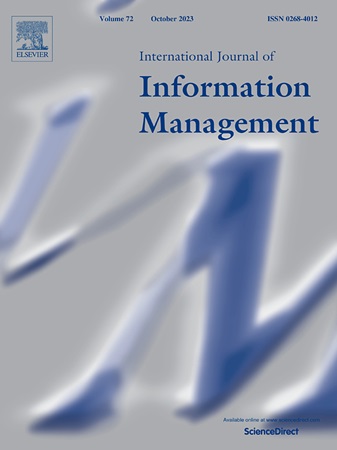Resistance to shared consumption: Exploring the interplay of access-temporality, economic-value, and anticipated regret in case of carsharing
IF 27
1区 管理学
Q1 INFORMATION SCIENCE & LIBRARY SCIENCE
International Journal of Information Management
Pub Date : 2025-02-11
DOI:10.1016/j.ijinfomgt.2025.102886
引用次数: 0
Abstract
Although the concept of shared consumption has garnered considerable scholarly attention, there remains a notable paucity of research on resistance to carsharing. In particular, the crucial role of access temporality, long-term economic evaluation, and anticipated regret has not been studied previously. While the economic benefit is considered a pivotal determinant of carsharing adoption, the potential for negative evaluation when consumers engage in long-term assessments remains underexplored. Further, its contribution to anticipated regret and its subsequent effect on carsharing resistance has not been studied. Addressing the gap, this study draws upon mental accounting theory and regret theory to examine the role of access temporality and long-term cues in the economic evaluation of carsharing and its relationship with anticipated regret contributing to consumers’ resistance towards carsharing. To this end, Study 1 and Study 2 employed two 2 × 2 experimental designs to demonstrate that long-term cues significantly alter consumers’ perceived economic value of carsharing. They illustrate that access temporality and usage frequency affect consumers’ economic evaluations of carsharing and their intention to engage. Further, Study 3 analysed 417 survey data responses using PLS-SEM to reveal that lower economic value perception, anticipated regret, and status quo bias contribute to consumers’ resistance to using sharing. The results confirm the importance of access temporality and frequency of use influencing consumers’ perceived economic value of carsharing.
对共享消费的抵制:探索在汽车共享的情况下,访问-暂时性,经济价值和预期后悔的相互作用
虽然共享消费的概念已经引起了相当大的学术关注,但对汽车共享的抵制研究仍然明显缺乏。特别是,获取时间、长期经济评价和预期后悔的关键作用尚未得到研究。虽然经济效益被认为是汽车共享采用的关键决定因素,但当消费者参与长期评估时,负面评价的可能性仍未得到充分发掘。此外,其对预期后悔的贡献及其对共享汽车阻力的后续影响尚未得到研究。为了解决这一差距,本研究利用心理会计理论和后悔理论,考察了获取时效性和长期线索在汽车共享的经济评估中的作用,以及它与预期后悔的关系,从而促进消费者对汽车共享的抵制。为此,研究1和研究2采用了两个2 × 2实验设计来证明长期线索显著改变消费者对汽车共享的感知经济价值。他们表明,访问时间和使用频率影响消费者对汽车共享的经济评估和他们参与的意愿。研究3进一步利用PLS-SEM分析了417份调查数据,发现较低的经济价值感知、预期后悔和现状偏见是消费者抵制分享的原因。研究结果证实了访问时间和使用频率对消费者感知的汽车共享经济价值的重要性。
本文章由计算机程序翻译,如有差异,请以英文原文为准。
求助全文
约1分钟内获得全文
求助全文
来源期刊

International Journal of Information Management
INFORMATION SCIENCE & LIBRARY SCIENCE-
CiteScore
53.10
自引率
6.20%
发文量
111
审稿时长
24 days
期刊介绍:
The International Journal of Information Management (IJIM) is a distinguished, international, and peer-reviewed journal dedicated to providing its readers with top-notch analysis and discussions within the evolving field of information management. Key features of the journal include:
Comprehensive Coverage:
IJIM keeps readers informed with major papers, reports, and reviews.
Topical Relevance:
The journal remains current and relevant through Viewpoint articles and regular features like Research Notes, Case Studies, and a Reviews section, ensuring readers are updated on contemporary issues.
Focus on Quality:
IJIM prioritizes high-quality papers that address contemporary issues in information management.
 求助内容:
求助内容: 应助结果提醒方式:
应助结果提醒方式:


